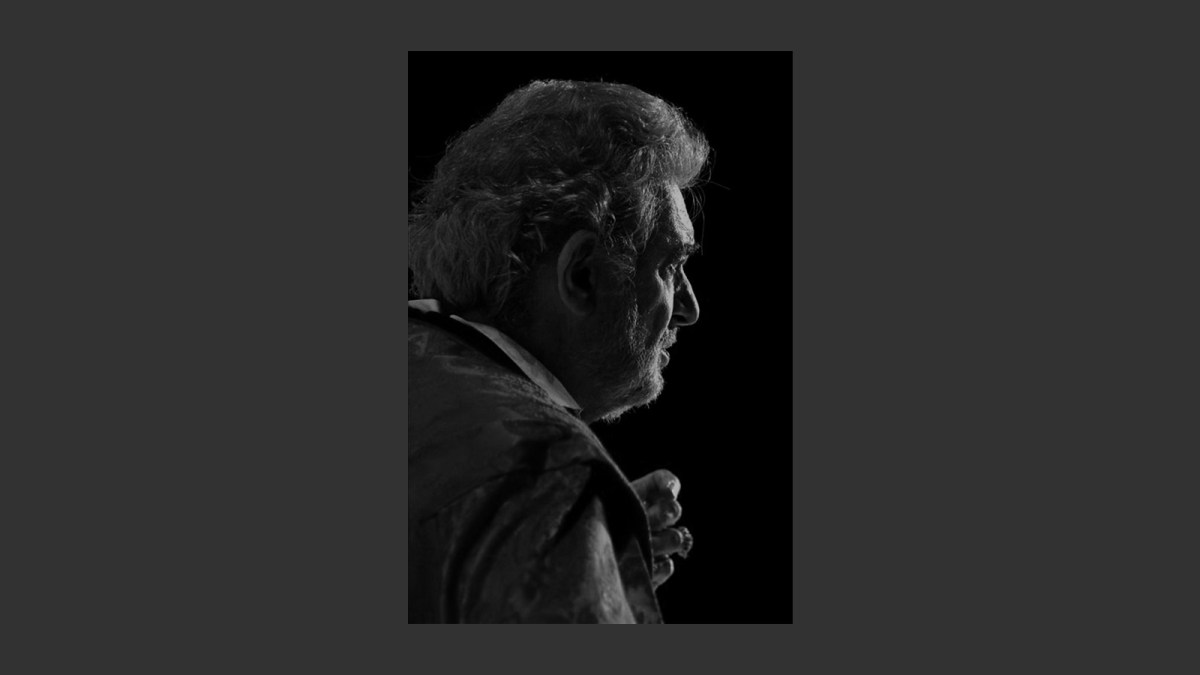Last week, multiple Argentine newspapers broke the story of Plácido Domingo’s alleged connections to four members of a criminal cult called Escuela de Yoga de Buenos Aires, or the Buenos Aires Yoga School. Sources close to the investigation told the media that Domingo has known these alleged cult members for 26 years. Two of the four people are currently in custody, one is on the lam, and the fourth died four years ago. The cult was active for over 30 years and stands accused of money laundering, blackmail, human trafficking, and illegal prostitution, including of minors. Its sexual services were allegedly sold under the codename VIP Geisha, and targeted to international celebrities and CEOS, mainly in Buenos Aires but also in Las Vegas, Chicago, and New York.
In three phone calls wiretapped by the police and published in the newspaper El Diario and elsewhere, a man alleged by the Argentine authorities to be Plácido Domingo and a high-ranking cult member, Susana “Mendy” Mendelievich, are heard discussing arrangements for the singer to have a sexual meetup in his hotel. In one of the recordings, the man is heard discussing security measures; he wants to avoid his agents finding out about the assignation. “When we get up from dinner, we’ll go upstairs separately, because my agents will go to their rooms as well and we’re on the same floor,” the man (allegedly Domingo) says. He gives Mendelievich his room number, where the tryst will take place. (Besides being an alleged member of the Yoga School, Mendelievich is also a pianist and composer.)
In another wiretapped call, Mendelievich is heard telling the leader of the Yoga School, Juan Percowicz, that she was contacted by a man named Plácido. “He can visit us, I mean, he will visit me… “ she says. “I’ll have to sacrifice myself again, I was clearly meant to be of service.” In a third call, Mendelievich describes the preparations for the same meeting to Percowicz. “He called me and worked out a plan so that I could stay in the hotel without his agents noticing,” she tells Percowicz. “What a degenerate person you are,” he answers. (It’s not clear whether the meeting took place. Domingo performed last April at the Teatro Colón in Buenos Aires.)
In a further wiretapped call, Mendelievich and another member of the Yoga School cult seem to discuss failed attempts to exploit the connections between Domingo and musicians belonging to the cult to gain the star tenor as a member. “We’ve been trying for 30 years to use these musical [connections], and we still haven’t succeeded” in recruiting Domingo, Mendelievich says, according to the Spanish newspaper El País.
Mendelievich, age 75, and Percowicz, age 84, were arrested last week. Domingo was allegedly also in contact with oboist Mariano Krawczyk (alias Kraus), who has been arrested as well, and Rubén González, who died in 2018. González was the concertmaster of the Chicago Symphony Orchestra between 1986 and 1996 and is suspected of opening a branch of the Yoga School cult in Chicago.
Domingo did not deny that he was the man in the wiretapped recordings. Instead, he said that he viewed the members of the cult as “musicians he was friends with” and was unaware of their alleged criminal activities.
Domingo had not responded to requests for comment, but, in an interview given Wednesday while in Monterrey, Mexico for a performance, he did not deny that he was the man in the wiretapped recordings. Instead, he says that he viewed the members of the cult as “musicians he was friends with” and was unaware of their alleged criminal activities. Asked whether he felt betrayed by the revelations, Domingo tells the journalist, “It makes me sad when you have friends for many years and realize you’ve been used.”
Domingo, Mendelievich, Kraus and González share a musical past that stretches back decades. Argentine media note that, on February 20, 1996, a performance of an excerpt of an opera called “Cartas Marcadas” (“Marked Cards”) took place at the Campo Argentino de Polo; the opera was composed by Mendielivich, Kraus and González, its libretto based on a book by Percowicz, the founder of the cult. Domingo performed a duet from the opera with the soprano Verónica Loiácono in the concert. Loiácono, who supposedly lives in the United States, is currently being sought by Interpol for her alleged role in the Yoga School of Buenos Aires. (The Argentine newspaper La Nacion reviewed the performance.)
In August 2019, Jocelyn Gecker of the Associated Press published a detailed report on allegations of sexual harassment against Domingo. More than 20 women came forward to accuse Domingo of sexual harassment, and the allegations included wet kisses on the lips, under-skirt groping, persistent stalking in dressing rooms, and ceaseless nighttime phone calls. Multiple singers told Gecker that Domingo faked an interest in their careers in order to engineer intimate situations in which he pressured them sexually. Seven women said that their careers were damaged because they rejected his advances.
In a phone call wiretapped by Argentine investigators referring to the AP’s reporting, Mendelievich tells Percowicz that Domingo “is sitting in the shit, I’m sorry, I don’t have any ill will towards him, but it’s so nice to see how we shine and fly through the air, and he is sitting in the shit. He told us everything they did to him.”
In a February 2020 statement, Domingo apologized to “any colleagues whom I could have hurt in any way by something I said or did. As I have demonstrated on many occasions, it was never my intention to hurt or offend anyone.” He added, however, “I know what I haven’t done and I will deny it again. I never behaved aggressively with anyone and I have never done anything to obstruct or impede anyone’s career.”
The reaction to the 2019 sexual harassment allegations was profoundly different on different sides of the Atlantic.
The reaction to the 2019 sexual harassment allegations was profoundly different on different sides of the Atlantic. In the United States, almost every institution closely associated with Domingo, including the Los Angeles Opera and the Metropolitan Opera, immediately cut ties with the singer. In Europe, his performances at institutions such as the Elbphilharmonie Hamburg, the Salzburg Festival, and the Staatsoper Berlin went ahead as planned. Their explanations for this choice combined the legal principle of “innocent until proven guilty” with a fundamental distrust toward Domingo’s accusers. “I’ve known Plácido Domingo for over 25 years now,” wrote Helga Rabl-Stadler, then the president of the Salzburg Festival, in a statement. “Besides his artistic ability, I’ve always been impressed with his very respectful interactions with all the employees of the festival.”
Other singers and journalists saw Domingo not as a perpetrator, but as a victim of so-called cancel culture. “I support You with all my heart and I hope that this terrible absurd [sic] will soon be over. Thank You for everything You’ve given to our World!!! You are GREAT!!! #standbyplacidodomingo #isupportplacidodomingo,” wrote soprano Asmik Grigorian on Facebook. In an op-ed, the German journalist Maria Ossowski wrote that the #MeToo movement would do better to focus on cases in which women were “tortured, beaten, raped, subjected to genital mutilation, forced into prostitution and the porn industry, stripped of their rights or murdered.” She added that “inappropriate kisses on the mouth,” as Domingo was accused of, belong to the operatic game of seduction and “are enlivening in reality as well.”
Gecker’s 2019 investigation was meticulously reported and fact-checked, and its findings were later confirmed in an investigation by the American Guild of Musical Arts. The new allegations surrounding the Buenos Aires Yoga School cult make a less obvious case. An anonymous Argentine police official told the Associated Press that Domingo was not suspected of a crime, and was not a member of the cult, but rather “a customer of prostitution.” (Prostitution is legal in Argentina.) There have been no charges against the singer so far.
Further investigation will show if Domingo was aware of the Yoga School cult’s alleged crimes and of his friends’ connections to the group. But the media reaction to the story shows a tendency to exaggerate suspicions and report tendentiously where celebrities are concerned. The major Argentine newspapers have reported comprehensively on the case and its background, the details of the investigation, and the cult’s networks and structure. They mention the calls in which Domingo allegedly participated, but also his presumed innocence. The second largest Argentine newspaper, Clarin, doesn’t mention Domingo in its reporting.
With the information we have so far, Domingo’s connection to the cult seems tenuous. According to El País, investigators wiretapped the phones of 35 cult members and recorded 176,000 hours of material. References to Domingo beyond the phone calls mentioned were not found.
Domingo’s connections to the cult members do not show further evidence of abuse of power or sexual harassment, only raising the possibility that he participated in legal prostitution.
In an op-ed for the Washington Post, Michael Andor Brodeur describes the case as confirmation of the accusations of sexual harassment reported against Domingo in 2019. But Domingo’s connections to the cult members don’t show further evidence of abuse of power or sexual harassment, only raising the possibility that he participated in legal prostitution. Without giving a detailed description of the investigation, Brodeur writes, “Most changes take time in opera — diversifying casts, re-examining the canon, raising marginalized perspectives to the level of the stage. But the Domingo problem is easy. Stop booking him.” It remains to be seen whether promoters will take this advice. Outside the United States, the #MeToo allegations have hardly seemed to hurt Domingo’s career (or his popularity with fans). A concert on October 16 in Santiago de Chile was canceled due to “logistical difficulties.” But Domingo will be in Germany soon, performing on October 3 at the Elbphilharmonie. ¶


